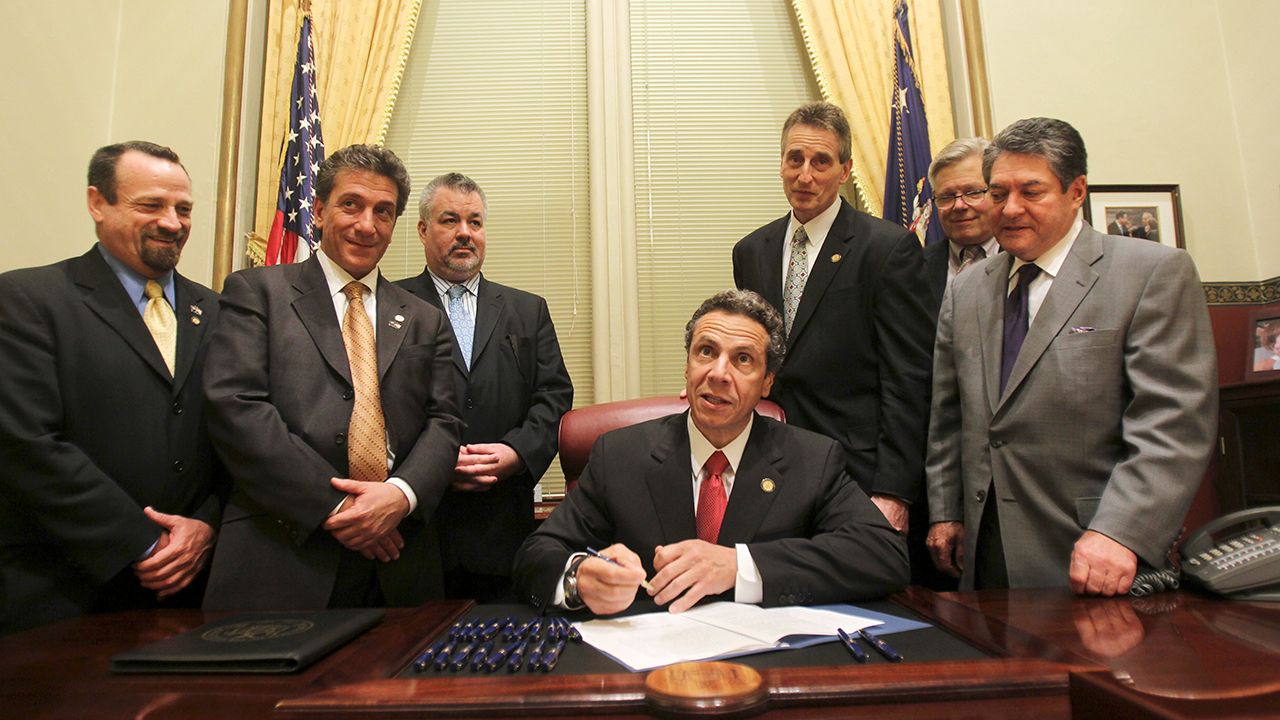The first time former Mayor Mike Bloomberg in a debate this week played up his role in the push getting Republicans in the state Senate to support same-sex marriage, Gov. Andrew Cuomo shrugged it off.
The second time Bloomberg did so in a CNN town hall on Wednesday night, Cuomo's gloves came off.
"You should not say something that is demonstrably false on an immediate basis and that is just demonstrably false," Cuomo said at a news conference on Thursday. "A lot of people worked very hard on that bill."
Cuomo's comments were preceded by a pair of phone calls to NY1's Zack Fink from two of the Republicans who supported the law in 2011 -- former Sens. Mark Grisanti and Jim Alesi -- who attested to Cuomo's role in getting them to vote for the measure and said Bloomberg was not a factor.
Bloomberg's affirmative claim in the town hall -- "I went up to Albany and I went to the Republicans and I sat down with a bunch of them, and I convinced the Republicans, even though I was a very liberal New York City mayor, I convinced them to vote for gay marriage" -- goes to the heart of what has been Cuomo's legacy.
It's easy to imagine governor's obituary one day will include the legalization vote in the lede.
The vote was historic. New York was the first large state to pass such a law. It was cited by President Obama when he announced his support for gay marriage. And it was cited in Supreme Court Justice Anthony Kennedy's majority opinion when gay marriage became the law of the land.
Bloomberg, a Republican at the time, did meet with Republicans in the state Senate in the lead up to the vote. The meeting was also the subject of short-lived lawsuit by opponents of the law, who had claimed his appearance in the closed-door conference violated the open meetings statute.
Bloomberg also contributed to the campaigns of the Republicans who voted for the measure -- Grisanti, Roy McDonald and Steve Saland -- as well as held fundraisers for them. They would all lose their Republican primaries.
Cuomo dismissed, however, the idea the lawmakers were motivated by Bloomberg's largesse.
"I think the Republicans who have voted for it as a matter of their conscience and they didn't even talk about it," Cuomo said. "They're political heroes to me. I'm not going to besmirch or diminish what they did."
The marriage vote is fading into memory at the Capitol. Most of the press, staff and Legislature have nearly turned over in the last 10 years since the vote in June 2011 was held.
But it remains one of the most consequential things to happen under Cuomo. As the vote approached, Cuomo secured public commitments from Democrats who had not supported the proposal during a failed vote a year earlier.
And he met privately with Republicans to hammer out language and secure agreements for the vote.
The marriage vote itself occurred several days after the legislative session was scheduled to end. It was informally packaged with a property tax cap, the extension of rent control and support for the University at Buffalo.
At the time of the vote in the state Senate, only a handful of lawmakers spoke. There was concern -- bordering on paranoia -- that Democrats in the state Senate would somehow sink the carefully crafted agreement to keep the issue alive.
To stoop to a football analogy, 2011 began with the ball on the 35-yard line and Cuomo executed a series of 10 and 15-yard plays to get the measure into the end zone.
Credit though can be spread across a generation of LGBTQ advocacy, figures like former Sen. Tom Duane, the first openly gay member of the state Senate who encouraged Democrats on the legislation, the push by advocates to fund campaigns against opponents, the empathy given to McDonald by his grandchildren, the mayor of New Paltz officiating marriages for gay couples in 2005, the viral speech by Sen. Diane Savino after the failed 2009 vote -- and on and on.
The legalization of same-sex marriage deserves a Caro-esque telling, or at the very least an oral history.
And it's a legacy Cuomo wants to very much keep intact.
Bloomberg is citing the marriage vote in part because he wants to show how -- unlike some of his rivals for the Democratic presidential nomination -- he can work with Republicans to Get Things Done.
Cuomo has made similar arguments in the past on the state level. When he met with state Senate Republicans early in his time in office he would tell them they aren't tea party Republicans, but Rockefeller Republicans.
And indeed, Cuomo had a GOP leadership in the state Senate that spoke the language of deal making.
Republicans in Washington, however, could very likely be a different case for a President Bloomberg.


